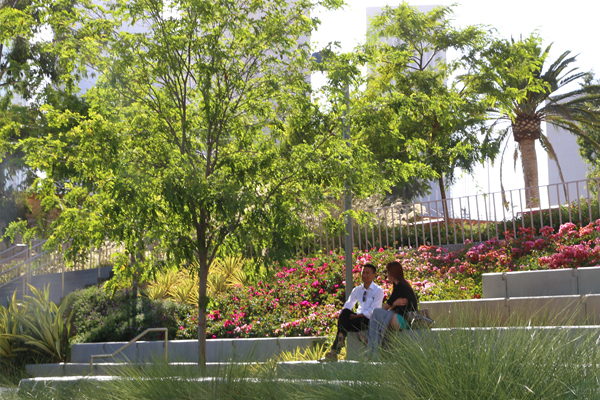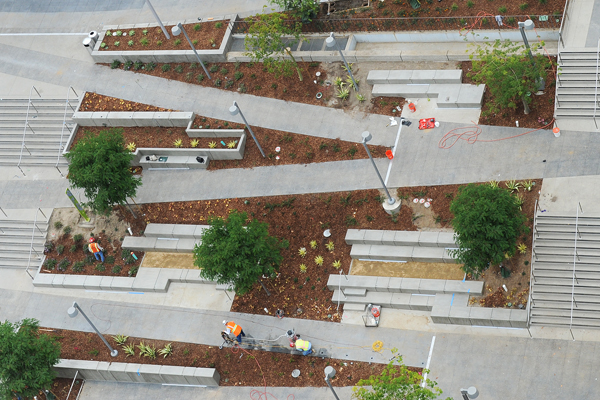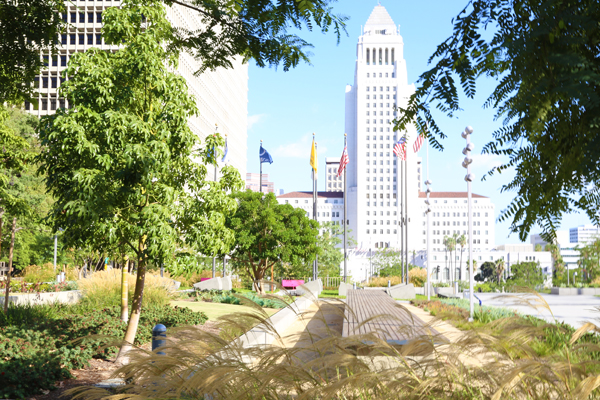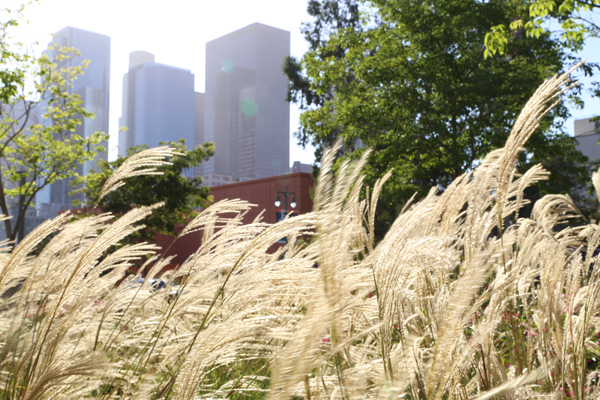It is hard to believe that the park is now well over three years old. I remember four and a half years ago when I would go out of my way to walk or drive by Grand Park on my routes home just so I could catch a glimpse of the construction progress. Watching it evolve through the cracks of the mesh green fences became a part of my daily trek. It was so exciting to see this much-needed green space grow from rendering to reality.
When I heard I was getting to meet with the masterminds of Grand Park, I became so excited. As a young boy, I dreamed of becoming an architect. My dad would drive me through various neighborhoods for inspiration, and I would immediately request to rush home so I could sketch a better version of the homes and public spaces we had discovered. Paper pads and colored pencils were a consistent birthday gift for me each year. This is probably why I love downtown so much. I have the same routine as I did when I was younger. I continue to imagine the future. When I sat down with architects John Fishback, Tony Paradowski and Jessa Chisari of Rios Clemente Hale Studios, I had many questions on my agenda. What was their vision for the park? What were their obstacles? What were some of their favorite features?
As we chatted over lunch, I quickly learned that as landscape architects, their favorite feature of the park was to no surprise, the plants. A huge component of the park that some may not have noticed is that park is home to plants from all over the world and planted within with curved lines all throughout the park. These lines represent the meridians of the earth. Various floristic gardens feature plants that are living in Los Angeles but are also native to different regions all over the world. During the year these native plants come alive and go dormant. No matter what the season there is always something in bloom.
“One of my favorite parts of the Grand Park project was tree selection and planting.” John explained. “During the construction process I had the pleasure of visiting many nurseries in search of the 325 new trees that were to be planted at Grand Park.” With the exception of the 40 Sycamores trees that were planted throughout the park, each tree was individually selected for its branching structure and overall form. John had the opportunity to personally oversee the planting of new trees as well as a number of existing trees that were being relocated to different parts of the park. “I specified the orientation of each individual tree based upon views to promote the growth of major branches over the walkways and to create shade. It was so much fun!”
“One of my favorite trees in Grand Park is the Phoenix Canariensis, the Canary Island Palm.” Though the park is filled with the unofficial tree of LA, the palm, John did not originally love the tropical tree. “When I first moved to Los Angeles I did not like palm trees. They seemed so pointless because they never made very much shade and were usually planted as single trees, far apart from one another.” The palm garden at The Huntington changed John’s mind. “I learned to really like a lot of the palms, especially when planted in a cluster to create an oasis of shade.”
The designers at Rios Clemente Hale also had many obstacles and restrictions when choosing what plants went where. Because two blocks of the park sit above a parking lot constructed in the 60s, engineers had to come in and determine just how many plants and soil the parking lot could support. Because of this Tony told me a little secret on just how they made it work. Many planter beds in many parts of the park sit in about four feet of soil, atop various depths of good old-fashioned polystyrene foam (Styrofoam) to decrease the weight put on the existing parking lot. This fascinated me. We are walking through this urban oasis that, come to find out, literally has so much depth to it.
Though the designers spent years selecting what plants would work with these restrictions, nowhere in the park will you find a lack of foliage. Over the past year I have enjoyed exploring the different plants that make up the park. One of my favorite plants is the Evergreen Fountain Grass. Growing up in northern California, there was never a shortage of huge fields filled with this grass. One could gaze out and see acres and acres of grass. There is a different backdrop with this grass here in Los Angeles as shown below, but it meshes a little bit of my old home and my new home quite nicely!
What is your favorite plant located in the park?
Give us a shout out tomorrow on Twitter or Instagram @grandpark_LA using the hashtag #floresdegrandpark to let us know!
–Joshua Levi, special to Grand Park, Downtown With Me







